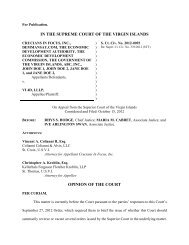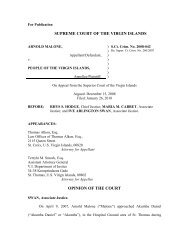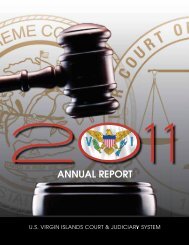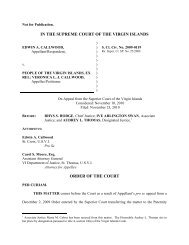IN THE SUPREME COURT OF THE VIRGIN ISLANDS OPINION OF ...
IN THE SUPREME COURT OF THE VIRGIN ISLANDS OPINION OF ...
IN THE SUPREME COURT OF THE VIRGIN ISLANDS OPINION OF ...
You also want an ePaper? Increase the reach of your titles
YUMPU automatically turns print PDFs into web optimized ePapers that Google loves.
Terrell v. Coral WorldS. Ct. Civ. No. 2010-0058Opinion of the CourtPage 11 of 15Likewise, although section 21(c) of the Revised Organic Act provides the Legislature andthe courts with concurrent authority to establish procedural rules governing court proceedings,see Phillips v. People, 51 V.I. 258, 275 (V.I. 2009), this Court can find no authority for theSuperior Court to increase the witness attendance fee beyond that set forth in section 660.Although Federal Rule of Civil Procedure 45, which governs subpoenas in federal courts,provides that, when serving a subpoena, one must also “tender[] the fees for 1 day's attendanceand the mileage allowed by law,” Fed. R. Civ. P. 45(b)(1), the rule itself does not expresslyreference section 1821, even though that is the statute that would apply in a federal court.Moreover, even if Federal Rule of Civil Procedure 45 could be interpreted as implicitlyincorporating section 1821, those provisions are inapplicable to Superior Court proceedingsthrough Superior Court Rule 7 because (1) Superior Court Rule 11 governs subpoenas in theSuperior Court, and thus application of Federal Rule of Civil Procedure 45 would render Rule 11“wholly superfluous,” see Corraspe v. People, 53 V.I. 470, 482 (V.I. 2010); 12 and (2) section660 establishes a substantive right that cannot be altered by invoking a substantive federal statutethrough a court rule, 13 see Gov’t of the V.I. v. Durant, 49 V.I. 366, 373 (V.I. 2008). 1412 We note that the Superior Court has recently applied Corraspe to hold that Federal Rule of Civil Procedure 45 isnot inconsistent with Superior Court Rule 11 because the federal rule “supplements” the Superior Court rule bycreating additional requirements that exceed the minimum provided for in the local rule. See Bertrand v. CordinerEnters., Inc., --- V.I. ---, Civil No., ST-08-CV-457, slip op. at 3-4 (Super. Ct. June 27, 2011). However, this Courthas effectively rejected the argument that Superior Court Rule 7 can be invoked to have a federal rule “supplement”a local rule in such a manner. See Blyden v. People, 53 V.I. 637, 659 (V.I. 2010), aff’d by People v. Blyden, No. 10-3656, 2011 WL 1468098 (3d Cir. Apr. 19, 2011) (holding that Federal Rule of Evidence 901’s requirement that allpieces of evidence be authenticated cannot apply to Superior Court proceedings through Superior Court Rule 7 whenlocal rule of evidence only required authentication of writings).13 Importantly, although the Legislature has delegated the power to fix some fees to the Superior Court, this powerdoes not extend to fees that have already been set by statute. See 4 V.I.C. § 514.14 It is well-established that when a statute authorizes taxation of costs, “‘costs’ are not synonymous with expensesunless expressly made so by statute.” Benda v. Fana, 227 N.E.2d 197, 201 (Ohio 1967). As the Supreme Court ofOhio succinctly explained, limiting “costs” to what is specifically provided for in a fee-shifting statute is necessaryin order to avoid “absurd situations” that the legislature could not have intended, such as placing a litigant “with the
















